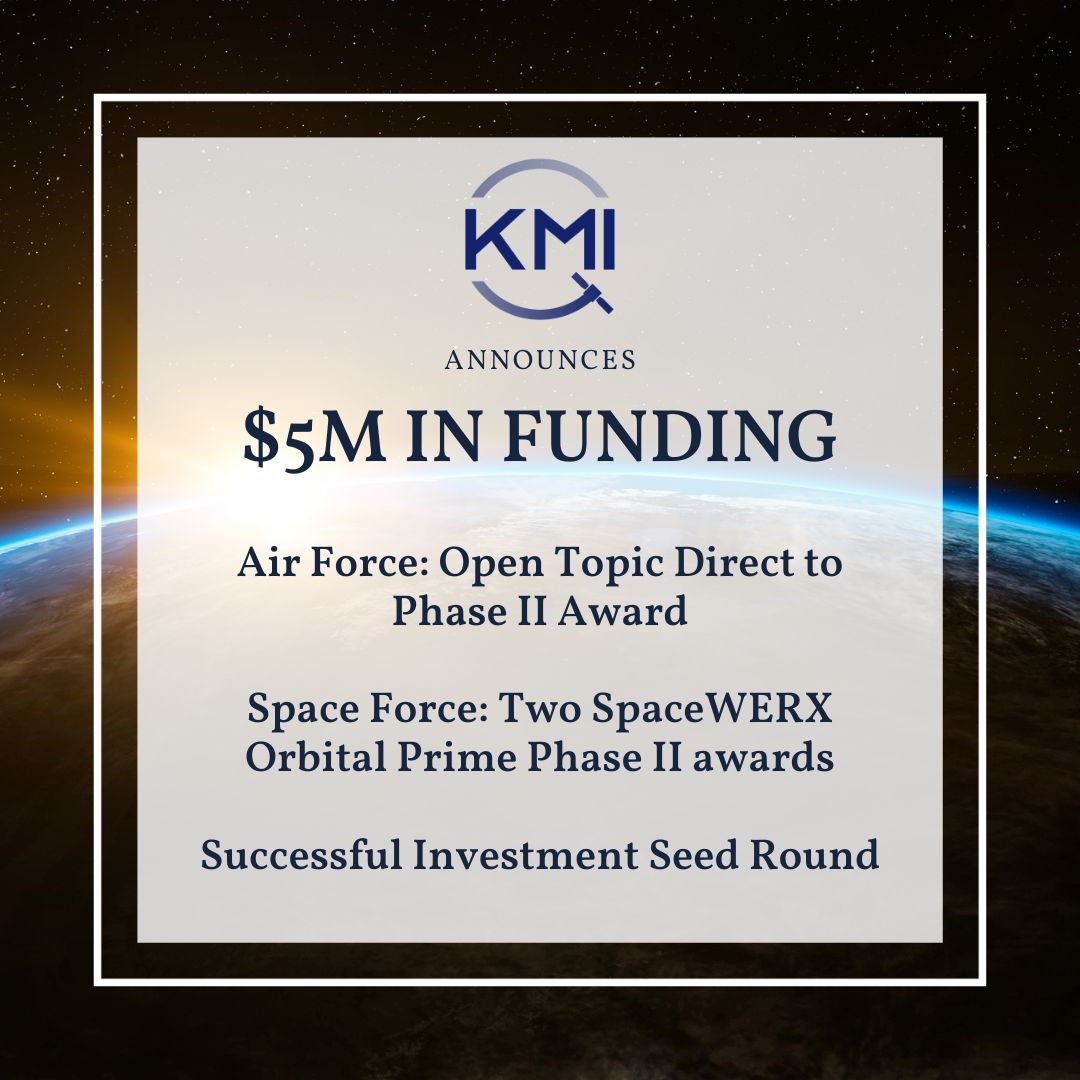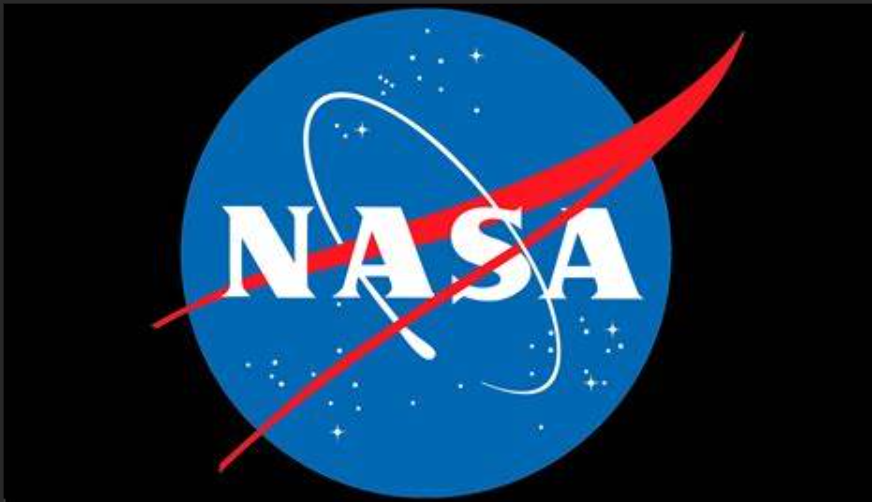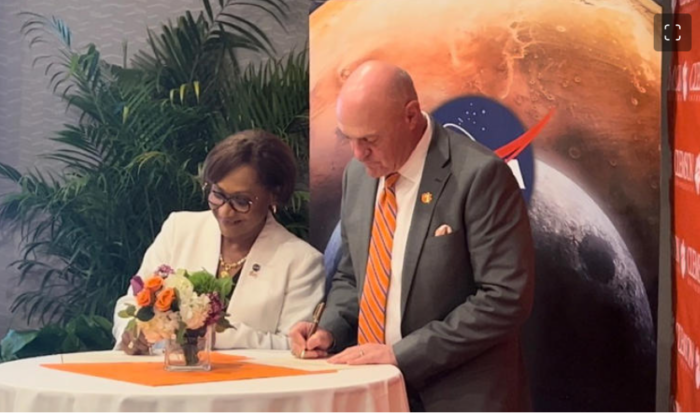Space Impulse Brief:
- Kall Morris Inc (KMI) announces completed funding of US $5 million from successful investment, multiple selections by AFWERX for STTR Phase II, and a Direct-to-Phase II contract focused on space debris management to address the most pressing challenges in the Department of the Air Force (DAF).
- Building on the success of Phase I, where KMI secured three USSF SpaceWERX Small Business Technology Transfer (STTR) contracts worth US $750,000.
- Following a successful pre-seed investment round led by Michigan Rise Pre-Seed Fund III, KMI has increased its staff, facilities, and investment in the Michigan region.
PRESS RELEASE — Marquette, Michigan / November 6, 2023 — Kall Morris Inc (KMI) announces completed funding of $5 million from successful investment, multiple selections by AFWERX for STTR Phase II, and a Direct-to-Phase II contract focused on space debris management to address the most pressing challenges in the Department of the Air Force (DAF). The Air Force Research Laboratory and AFWERX have partnered to streamline the Small Business Innovation Research (SBIR) and Small Business Technology Transfer (STTR) process by accelerating the small business experience through faster proposal to award timelines, changing the pool of potential applicants by expanding opportunities to small business and eliminating bureaucratic overhead by continually implementing process improvement changes in contract execution. The DAF began offering the Open Topic SBIR/STTR program in 2018 and SpaceWERX Orbital Prime program in 2022. The programs expanded the range of innovations the DAF funded and now KMI will continue its journey to create and provide innovative capabilities that will strengthen the national capabilities of the United States of America.
Building on the success of Phase I, where KMI secured three USSF SpaceWERX Small Business Technology Transfer (STTR) contracts worth $750,000, the company is poised to make significant strides in the field of In-space Servicing, Assembly, and Manufacturing (ISAM). The company’s commitment to innovation, combined with the dedication of its technical team, based in Marquette, led to the successful development and validation of groundbreaking technologies that support ISAM.
Following a successful pre-seed investment round led by Michigan Rise Pre-Seed Fund III, KMI has increased its staff, facilities, and investment in the Michigan region. These increases have also led to more opportunities for KMI as well. This growth is a testament to the company’s vision and the talent of its team, as highlighted in a previous article in The New Yorker.
“With the opening of our prototype lab and offices, the closing of our Seed round, this continuing support of Space Force with the addition of Air Force awards brings KMI to the next level. With these concurrent developments aligned with our upcoming orbital experiment, our work with the Department of Defense elevates our abilities to enable capabilities for space in multiple domains and functions,” said Troy M, Morris, KMI Co-Founder and CEO. “At every opportunity and advantage we earn, I’m proud of the brilliant team of professionals from NASA, US Air Force, US Army, industry, and across academia that have chosen to join our team as Space Rangers, and move KMI closer to Keeping Space Clear For All.”
The Orbital Prime program underscores the importance of Active Debris Removal (ADR) in safeguarding Earth’s orbit, with an estimated total value of $50 billion. As stated by Rep. Jim Cooper in the Space Threat Assessment 2019:
“We are almost as dependent on satellites as we are on the sun.”
The first USSF vice chief of space operations, Gen. David “DT” Thompson, has emphasized the significance of ADR by stating:
“I’ll pay by the ton if they can remove debris.”
KMI’s USSF contracts empower emerging technologies and startups to contribute positively to Earth’s orbit and beyond.
KMI’s selected USSF Phase II initiatives consist of two groundbreaking projects, REACCH for advanced agnostic in-space grappling and Asteria for secondary payload attachments, and advances those technologies in the USAF Direct to Phase II by further developing the Laelaps spacecraft designs to host the critical technologies.
Partners on these projects include the University of Southern California on the REACCH effort, Stanford University and Tangram Flex Inc. for the Asteria effort, and EMAG Technologies Inc. of Ann Arbor, Michigan, as well as Orbion Space Technology out of Houghton, Michigan, for the Laelaps spacecraft development.
“Space debris is a huge problem that will require big ideas to solve,” said Brad King, CEO at Orbion Space Technology. “We are excited that KMI has included Orbion in their vision to clean up the global commons and ensure everyone can continue to benefit from all the ways that space enhances our lives here on Earth.”
With Phase II underway, KMI is poised to achieve new milestones in the realm of space debris management, bringing humanity one step closer to a safer and more sustainable orbital environment.
The projects depicted are sponsored by AFWERX, a component of the Air Force Research Laboratory (AFRL).
For more information about KMI’s REACCH or Asteria, please contact Liza Fust, KMI Director of Operations, at [email protected].
“The views expressed are those of the author and do not necessarily reflect the official policy or position of the Department of the Air Force, the Department of Defense, or the U.S. government.”
Contact Information:
Press Contact Name: Liza Fust
Press Contact Title: Director of Operations [email protected]
SOURCE: KMI
Featured image: Credit: KMI
If you found this article to be informative, you can explore more current space industry news, exclusives, interviews, and podcasts.
Share this article:








